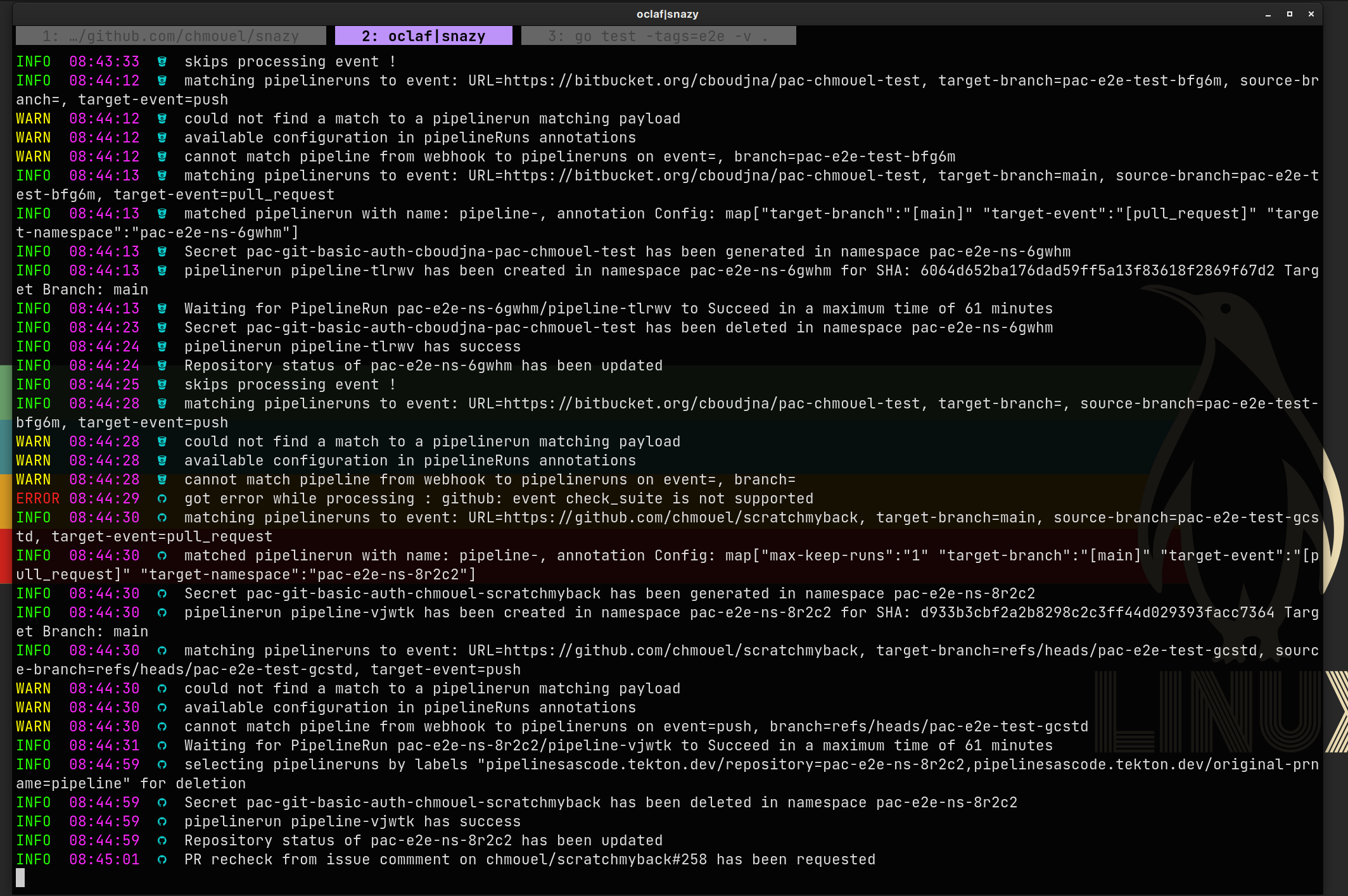How to get started developing for the Pipelines as Code project #
Please read the Code of conduct #
It’s important: https://github.com/openshift-pipelines/pipelines-as-code/blob/main/code-of-conduct.md
Use the all in one install on kind to develop #
It uses kind under docker. You start it with:
make allinone
When it finished you will have the following installed in your kind cluster:
- Kind Cluster deployment
- Internal registry to push to from
ko - A ingress controller with nginx for routing.
- Tekton and Dashboard installed with a ingress route.
- Pipelines as code deployed from your repo with ko.
By default it will try to install from
$GOPATH/src/github.com/openshift-pipelines/pipelines-as-code, if you want to
override it you can set the PAC_DIRS environment variable.
It will deploy under the nip.io domain reflector, the URL will be :
You will need to create secret yourself, if you have the pass cli installed you can point to a folder which contains : github-application-id github-private-key webhook.secret As configured from your GitHub application. Configre
PAC_PASS_SECRET_FOLDERenvironment variable to point to it. For example :pass insert github-app/github-application-id pass insert github-app/webhook.secret pass insert -m github-app/github-private-keyIf you need to redeploy your pac install (and only pac) you can do :
./install.sh -por directly with ko :
env KO_DOCKER_REPO=localhost:5000 ko apply -f ${1:-"config"} -Bmore flags:
-bto only do the kind creation+nginx+docker image,-rto install from latest stable release (override with env variablePAC_RELEASE) instead of ko.-cwill only do the pac configuration (ie: creation of secrets/ingress etc..)
Gitea #
Gitea is “unofficially” supported. You just need to configure Gitea the same way you do for other webhook methods with a token.
Here is an example of a Gitea NS/CRD/Secret (set to empty):
---
apiVersion: v1
kind: Namespace
metadata:
name: gitea
---
apiVersion: "pipelinesascode.tekton.dev/v1alpha1"
kind: Repository
metadata:
name: gitea
namespace: gitea
spec:
url: "https://gitea.my.com/owner/repo"
git_provider:
user: "git"
url: "Your gitea installation URL, i.e: https://gitea.my.com/"
secret:
name: "secret"
key: token
webhook_secret:
name: "secret"
key: "webhook"
---
apiVersion: v1
kind: Secret
metadata:
name: gitea-home-chmouel
namespace: gitea
type: Opaque
stringData:
token: "your token has generated in gitea"
webhook: "" # make sure it's empty when you set this up on the interface and here
There is some gotchas with the webhook validation secret, Pipelines as Code detect a Gitea install and let the user set a empty webhook secret (by default it’s enforced).
The install.sh script will by default spin up a new instance of GITEA to play
with and run the Gitea E2E tests.
You will need to create a Smee URL generated from https://smee.io/new
into the environment variable TEST_GITEA_SMEEURL.
The defaults are :
- URL: https://localhost:3000/
- Admin Username: pac
- Admin Password: pac
The E2E tests will automatically create repo using the admin username for each tests.
Debugging controller #
Create a smee URL and point your app/webhook to it. Use gosmee to forward the requests from github to your locally installed controller (this can be either run on your debugger or inside kind).
An option of gosmee is to save the replay to a directory with --saveDir /tmp/save. If go to that directory a shell script will be created to replay
the request that was sent directly to the controller without having to go through
another push.
Use snazy to watch the logs, it support pac by adding some context like which github provider.

Using the Makefile targets #
Several target in the Makefile is available, if you need to run them manually. You can list all the makefile targets with:
make help
For example to test and lint the go files :
make test lint-go
If you add a CLI command with help you will need to regenerate the golden files :
make update-golden
Configuring the Pre Push Git checks #
We are using several tools to verify that pipelines-as-code is up to a good coding and documentation standard. We use pre-commit tools to ensure before you send your PR that the commit is valid.
First you need to install pre-commit:
It should be available as package on Fedora and Brew or install it with pip.
When you have it installed add the hook to your repo by doing :
pre-commit install
This will run several hooks on the files that has been changed before you
push to your remote branch. If you need to skip the verification (for whatever
reason), you can do :
git push --no-verify
or you can disable individual hook with the SKIP variable:
SKIP=lint-md git push
If you want to manually run on everything:
make pre-commit
Developing the Documentation #
Documentation is important to us, most of the time new features or change of behaviour needs to include documentation part of the Pull Request.
We use hugo, if you want to preview your change, you need to install hugo and do a :
make docs-dev
this will start a hugo server with live preview of the docs on :
When we push the release, the docs get rebuilded by CloudFare.
By default the website https://pipelinesascode.com only contains the “stable”
documentation. If you want to preview the dev documentation as from main you
need to go to this URL:
https://main.pipelines-as-code.pages.dev
Documentation when we are doing the Release Process #
- See here release-process
Tools that are useful #
Several tools are used on CI and in pre-commit, the non exhaustive list you
need to have on your system:
- golangci-lint - For golang lint
- yamllint - For YAML lint
- pylint - Python linter
- black - Python code formatter check
- vale - For grammar check
- markdownlint - For markdown lint
- hugo - For documentation
- ko - To rebuild and push change to kube cluster.
- kind - For local devs
- snazy - To parse json logs nicely
- pre-commit - For checking commits before sending it to the outer loop.
- pass - For getting/storing secrets
- gosmee - For replaying webhooks